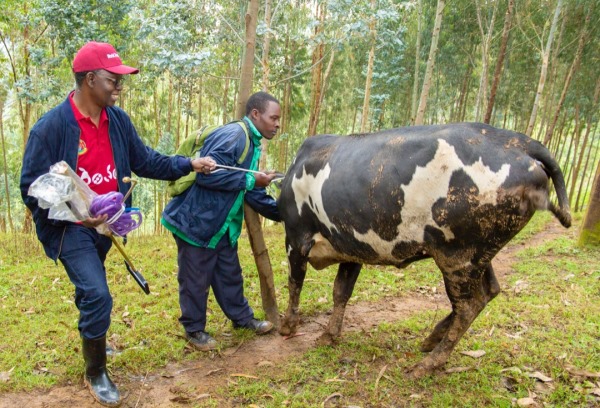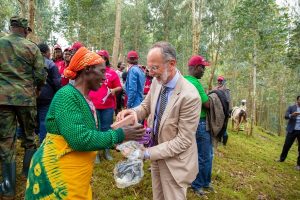
One UN Coordinator Fodé Ndiaye giving cow to a vulnerable resident
Nyabirasi, Rutsiro: During the World Food Day celebrations in Rwanda yesterday in Nyabirasi, Rutsiro District, on behalf of FAO, WFP, and IFAD, the UN Resident Coordinator, Fodé Ndiaye, has delivered an important message. Read his Speech below:
I am honored and pleased to stand before you at this occasion of the national celebration of the World Food Day to deliver a message on behalf of Food and Agriculture Organization of the United Nations (FAO) and the United Nations family in Rwanda.
FAO Representative in Rwanda, Gualbert Gbehounou giving milk to children.
Let me recall that FAO and partner UN Agencies mainly the World Food Programme (WFP) and the International Fund for Agricultural Development (IFAD) celebrate the international World Food Day each year on 16 October to commemorate the founding of FAO in 1945. At the occasion of the celebration of the World Food Day FAO reminds the world of its mission as FAOof the United Nations and in a way renews its commitment to support member countries to achieve a world free of hunger.
We are gathered here today to celebrate at national level in Rwanda the World Food Day under the same theme as the international World Food Day that is “Our actions are our future. Healthy diets for a #ZeroHunger world”.

Access to food is a fundamental human right and that’s why Sustainable Development Goal (SDG) 2 focuses on ending hunger and is an important aspect of our agenda 2030. World Food Day focuses on food as a basic and fundamental human right. The day calls for action to make healthy and sustainable diets accessible and affordable to everyone.
I would like to relay here few key messages delivered to the World on 16 October by the UN Secretary-General and the Heads of Rome based Agencies (RBAs) of the United Nations.

Dr. Qu Dongyu the Director-General of FAO said that “hunger and malnutrition will be major barriers to achieving the Sustainable Development Goals by 2030 if we do not act now!” He also stressed the importance of collaboration and the role everyone needs to play – from governments, food companies, the public sector, research institutions to consumers –to make progress towards enabling healthy diets for all, and to halt and hopefully reverse the current trend of rising hunger, overweight and obesity.”
At the occasion of the celebration of the international World Food Day the Director-General of FAO also announced the FAO’s biennial theme for 2020 – 2021 articulated as Promoting healthy diets and preventing all forms of malnutrition.
In his remarks, Dr Gilbert F. Houngbo, the President of the International IFAD insisted that “with the right policies and the right investments in agricultural and rural development we can create a food secure world where both hunger and poverty are dramatically reduced.”
Mr. David Beasley, Executive Director of WFP sharply echoed the call to end food waste and urged individuals around the world to join WFP’s campaign to #StopTheWaste. He rightly said “The amount of food wasted globally is enough to feed another 2 billion people. Wasting such amount of food in a world where every five seconds a child dies from preventable causes like hunger and malnutrition is totally unacceptable.” As he said “we have a solution to hunger in our hands, just by being better stewards of the food we already have. If we all come together, and work together, we can achieve Zero Hunger – but we must not rest until every child, everywhere, goes to bed with a full stomach.”
Ladies and gentlemen,
As we celebrate the World Food Day we must remember that there are over 820 million hungry people in the world. While the world faces the challenge of hunger, over 2 billion adults, and nearly 380 million children and adolescents, are overweight or obese. Such a sad, heart breaking reality reminds the world that our current food systems are failing to ensure food security for all and deliver on healthy diets whilst contributing to environmental degradation. Nowadays from agricultural production to processing and retailing, there is little space for fresh, locally produced foods. That’s where obesity stems from!
Unhealthy diets that induce overweight and obesity are one of the leading causes of death across the globe from non-communicable diseases (NCDs), including cardiovascular diseases, diabetes and certain cancers, taking a large toll on national health budgets. Obesity is projected to cost $2 trillion annually in lost economic productivity and direct health care costs worldwide.
But how to make healthy diets available and accessible for all? To address this situation, FAO calls for: better incentives for the world’s agricultural producers; easier-to-understand and more comprehensive food labels and responsible advertising to help consumers choose healthier diets; more sustainable trade with clear rules; and a push to think of nutrition as part of food safety.
The private sectors should also re-formulate products to make them more nutritious whilst food companies that produce nutritious foods could be given incentives to make their products more accessible and affordable.
Information and Communication Technology (ICT) should also be applied more widely along agriculture value chains to create new platforms, reduce urban-rural disparity and the potential of the smart phone as a new farming tool should be tapped for higher productivity.
FAO is working with partners and communities around the world to step up efforts to achieve SDG 2 – Zero Hunger and healthy diets.
This includes developing with the World Health Organization (WHO) guiding principles on “Healthy Sustainable Diets”, supporting the implementation of the Decade of Action on Nutrition (2016-2025), and providing support for global, regional and national food security and nutrition policies, strategies and programmes.
Here in Rwanda, I am pleased to note that the Government has given priority to hunger eradication and healthy diet in many ways. For example:
1. The Agriculture sector promoted home-grown interventions that impacted food security and nutrition at large scale such as Crop intensification programme;
2. One cow per poor family programme;
3. Kitchen garden programme;
4. One Cup of Milk per Child;
5. Promotion of nutrient-dense crops such as bio-fortification;
6. The Early Childhood Development (ECD programme) and the just approved joint programme “Effectively fighting chronic malnutrition in Rwanda” between the Government and fourUN agencies (FAO, UNICEF, WFP and WHO) are also good examples.
The project is developing Food-Based Dietary Guidelines (FBDGs) which are dietary recommendations expressed in terms of food and diet instead of nutrients, to be understood and used by the populations. Dietary guidelines are meant to inform and educate the general public about consuming more nutritious foods and living healthier lifestyles.
In line with national efforts to eradicate hunger and ensure healthy diets for all and considering that Rwanda has demonstrated that as a country it leads the way in many respects showing success stories that inspire other African countries I would like to echo a recommendation made by the participants to the first national training organized by FAO and the Ministry of Agriculture and Animal Resources on Nutrition Sensitive Agriculture in Rwanda at Musanze from 18 –21 February 2019.
The suggestion isthat national authorities of Rwanda could consider creationof a Centre of Excellence for Nutrition Sensitive Agriculture, it fits with the country’s efforts to increase the productivity and to tackle stunting. I am not aware of the existence of such Centre in Africa not even in the world.
If Rwanda creates a Centre of Excellence for Nutrition Sensitive Agriculture it would once again make a difference. Of course, the United Nations in general and FAO, WFP, IFAD and WHO is ready to ready the best way to support that endeavor should the Government decide to pursue it.
Let me conclude by the UN Secretary-General message on the WF Day: “Transforming food systems is crucial for delivering all the Sustainable Development Goals. That is why I hope to convene a Food Systems Summit in 2021 as part of the Decade of Action to deliver the Sustainable Development Goals. As a human family, a world free of hunger is our imperative.” Thank you for your attention! Happy World Food Day! (End)
